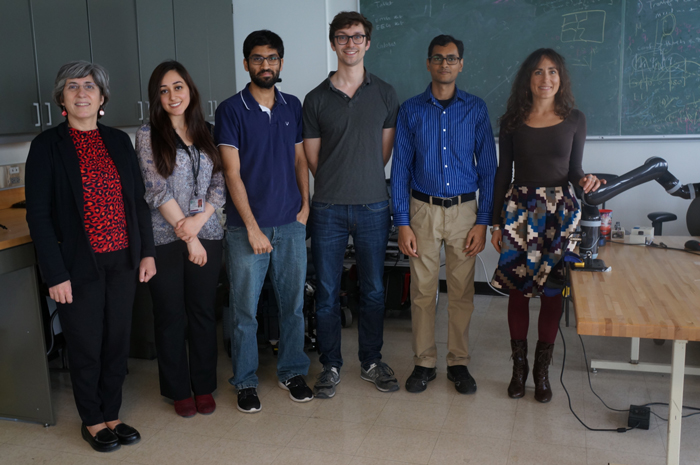Brenna ArgallAssociate Professor of Computer ScienceAssociate Professor of Mechanical EngineeringAssociate Professor of Physical Medicine and Rehabilitation

About Brenna Argall
Dr. Argall is an associate professor of Mechanical Engineering, Computer Science, and Physical Medicine & Rehabilitation at Northwestern University. Her research lies at the intersection of robotics autonomy, machine learning and human rehabilitation. She is director of the assistive & rehabilitation robotics laboratory (argallab) at the Shirley Ryan AbilityLab, the nation’s premier rehabilitation hospital. The mission of the argallab is to advance human ability by leveraging robotics autonomy.
Argall is a 2016 recipient of the NSF CAREER award, and was named one of the 40 under 40 by Crain’s Chicago Business. Her Ph.D. in Robotics (2009) was received from the Robotics Institute at Carnegie Mellon University, where she was a member of the CORAL Research Group. Her B.S. in Mathematics (2002) also was received from Carnegie Mellon, where she minored in Music and Biological Sciences. Prior to joining Northwestern and RIC, she was a postdoctoral fellow (2009-2011) in the Learning Algorithms and Systems Laboratory at the École Polytechnique Fédérale de Lausanne (EPFL). Prior to graduate school she held a Computational Biology position in the Laboratory of Brain & Cognition at the National Institutes of Health (NIH).
About Argallab
The Assistive and Rehabilitation Robotics Laboratory (argallab) strives to advance human ability by leveraging robotics autonomy. I am the founder and director of the argallab, which is located at the Rehabilitation Institute of Chicago.
It is an irony that often the more severe a person’s motor impairment, the more challenging it is for them to operate the very assistive machines which might enhance their quality of life. A primary aim of the argallab is to address this confound by incorporating robotics autonomy and intelligence into assistive machines—turning the machine into a kind of robot, and offloading some of the control burden from the user to the machine.
Our lab strives to advance human ability through robotics autonomy—by easing the burden of operating assistive machines. Our lab’s research lies at the intersection of artificial intelligence, rehabilitation robotics and machine learning. By easing the control burden of assistive machines, the argallab strives to advance human ability through robotics autonomy.
A distinguishing theme present within many of our projects is that the machine automation is customizable—to a user’s physical abilities, personal preferences or even financial means. A fundamental question that arises time and again throughout many of our projects is how exactly to share control between the robot and the human user.
We are working with a range of hardware platforms, from smart wheelchairs to assistive robotic arms. Watch this video to learn what we are about and watch a seminar about our work.
Learn about open positions within my research group.
ECE 495: Machine Learning & Artificial Intelligence for Robotics.
Introductory Robotics Laboratory. View the course website.
Argall is also a faculty advisor for the Masters of Science in Robotics program.
Ph.D. Robotics, Carnegie Mellon University (2009)
M.S. Robotics, Carnegie Mellon University (2006)
B.S. Mathematics, Carnegie Mellon University (2002)
December 2016
Brenna is named one of the 40 under 40 by Crain’s Chicago Business.
September 2016
Our lab’s work has been in the news! Check out the coverage in Digital Trends, Crain’s Chicago Business, The Big Ten Network and NPR’s Morning Edition.
Alex’s article Real-Time Natural Language Corrections for Assistive Manipulation Tasks is accepted to IJRR.
For an overview of what we are about, check out Brenna’s recent CMU Robotics Institute Seminar:
June 2016
Michael, Mahdieh and Ahmetcan’s paper An Analysis of Degraded Communication Channels in Human-Robot Teaming and Implications for Dynamic Autonomy Allocation is accepted to FSR.
Alex’s paper Trust-based Control for Safe and Stable Shared Control Between Humans and Robots is accepted to RA-L and CASE.
Deepak and Siddarth’s paper User-Driven Customization of Shared Autonomy with an Assistive Robotic Arm: A First Assessment is accepted to RA-L and CASE.
Mahdieh’s paper Automated Incline and Drop-off Detection for Assistive Powered Wheelchairs is accepted to RO-MAN.
April 2016

Ahmetcan’s article The Effect Robotic Wheelchair Control Paradigm and Interface on User Performance, Effort and Preference: An Experimental Assessment is accepted to RAS.
Deepak’s paper Mode Switch Assistance To Maximize Human Intent Disambiguation is accepted to RSS.
Alex’s paper Learning Models for Shared Control of Human-Machine Systems with Unknown Dynamics is accepted to RSS.
Ahmetcan’s paper Prediction of User Preference over Shared-Control Paradigms for a Robotic Wheelchair is accepted to ICORR.
The lab demos in the Museum of Science and Industry for National Robotics Week.
March 2016
We moved! RIC is now the Shirely Ryan AbilityLab.
February 2016
Brenna wins the NSF Early Faculty CAREER Award, for her proposal Robot Learning from Motor-Impaired Teachers and Task Partners.
Brenna wins an ONR award, Dynamic Allocation of Autonomy for Limited-Bandwidth Human-Robot Teams Based on Measures of Trust in the Human.
January 2016
Alex’s paper Path Planning under Kinematic Constraints for Shared Human-Robot Control is accepted to ICAPS.
Siddarth’s paper Grasp Detection for Assistive Robotic Manipulation is accepted to ICRA.
Brenna wins an NIH SBIR award, Semi-autonomous Robotic Powered Wheelchair Functionality (collaboration with Innovative Design Labs).
